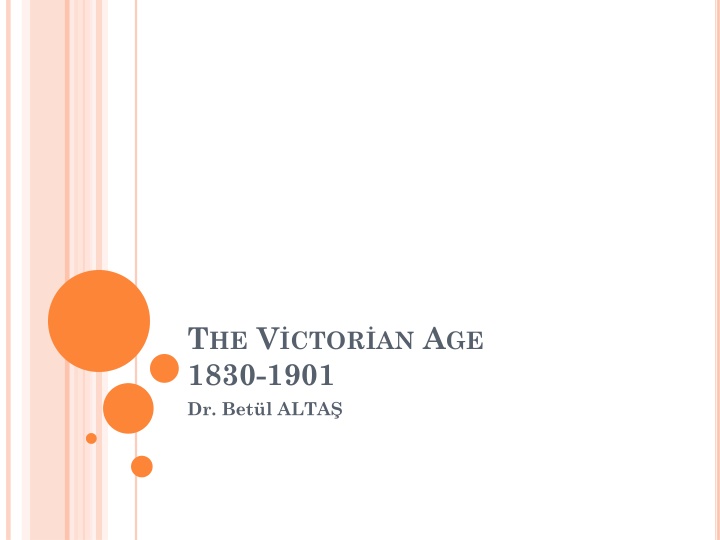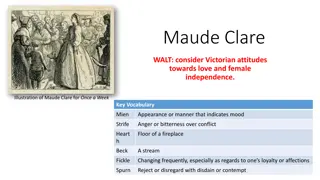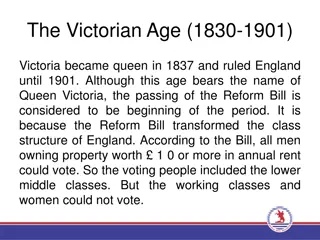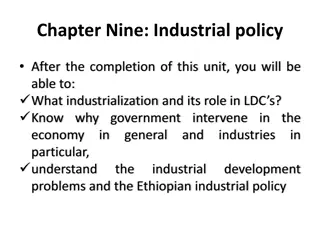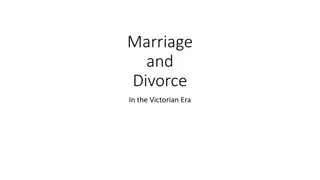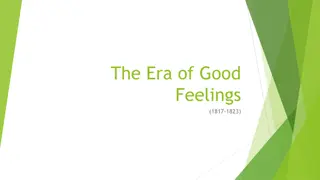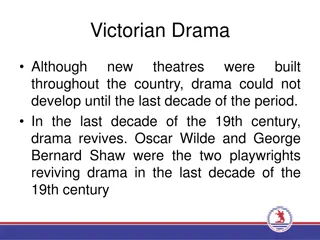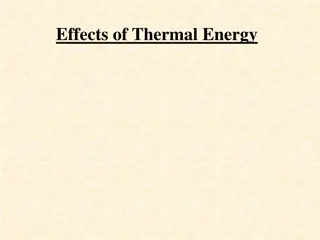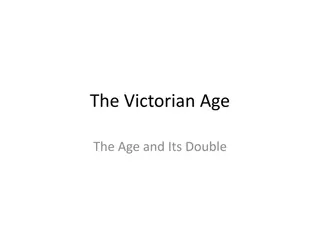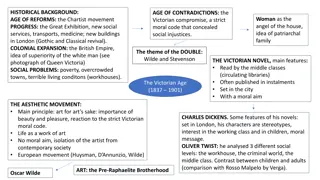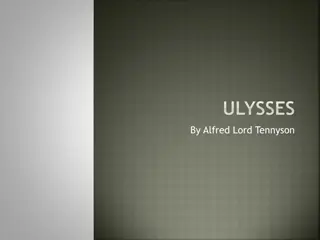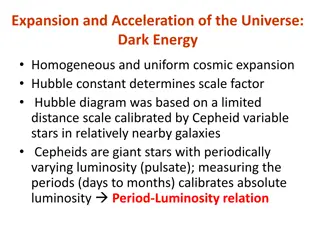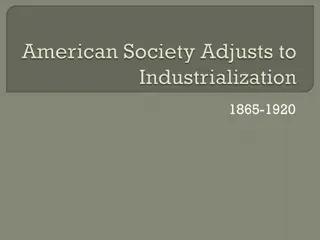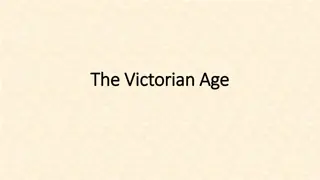The Victorian Age: England's Era of Expansion and Industrialization
England experienced significant growth and transformation during the Victorian Age (1830-1901). The period marked a shift to a modern urban economy, industrialization, and imperial power. London emerged as a pivotal city, and England became a global powerhouse through trade and colonization. Despite challenges, the era reflected a change in society, economy, and influence, shaping the country's trajectory for the future.
Download Presentation

Please find below an Image/Link to download the presentation.
The content on the website is provided AS IS for your information and personal use only. It may not be sold, licensed, or shared on other websites without obtaining consent from the author.If you encounter any issues during the download, it is possible that the publisher has removed the file from their server.
You are allowed to download the files provided on this website for personal or commercial use, subject to the condition that they are used lawfully. All files are the property of their respective owners.
The content on the website is provided AS IS for your information and personal use only. It may not be sold, licensed, or shared on other websites without obtaining consent from the author.
E N D
Presentation Transcript
THE VCTORAN AGE 1830-1901 Dr. Bet l ALTA
AN AGE OF EXPANSION England changed as much as it had in all of its previous history. England reached its height as a world imperial power in the 19th century.
In the 18th century, the pivotal city of Western civilazation had been Paris, but this center of influence had shifted to London by the second half the 19th century.
The population of London grew from about 2 million to over 6 million. The shift from a way of life based on ownership of land to a modern urban economy based on trade and manufacturing.
England was the first country to become industrialized and its transformation was painful too. There had been social and economic problems that resulted in unregulated industrialization. Profits gained from trade led to expensive capital investments in all continents.
England gained particular profit from the development of its own colonies. England became the world s workshop. From 1870 on, London became the world s banker. By the end of the century, England was the world s foremost imperial power.
DFFERENT CRTCAL REACTONS TO V CTOR AN AGE In the earlier decades of 20th century,writers struggled to separate themselves from the Victorians. The period takes its name from what was felt to be the unifying presence of its monarch. For a period almost 70 years in length, it is helpful to subdivide the age into three phases.
EARLY PERIOD (1830-48) In 1830, Liverpool and Manchester Railway opened. The Reform Bill of 1832 was passed in repsonse to demands of the middle classes who were gradually taking control of England s economy. 1832 Reform Bill marked the beginning of a new.
However, this legislation could hardly be expected to solve all economic, social and political problems which had been building up while England was developing into a modern democratic and industrialized state. This early period is regarded as Time of Troubles.
The Mid-Victorian Period (1848-70) 1. One of The Victorian writers such as Charles Dickens made attacks on the shortcomings of The Victorian Period. 2. John Ruskin also made criticisms with regard to Laissez-faire economics in Unto This Last.
WHAT S THE ROLE OF LAISSEZ-FAIRE ECONOMICS IN ENGLISH LITERATURE? Laissez-faire economics is a theory. It restricts government intervention in the economy. Laissez-faire is French for "let do." In other words, let the market do its own thing.
In a laissez-fair economy, the only role of government is to prevent any coercion against individuals. Theft, fraud, and monopolies prevent rational market forces from operating. Laissez-faire policies need three things to work. These are capitalism, the free market economy, and rational market theory.
As President Reagan famously said, "Government is not the solution to our problem, government is the problem." In laissez-faire, the government should let capitalism run its own course with as little interference as possible. On the whole, all instututions worked well. Pride in techonological improvement.
Utilitarian writers (followers of Jeremy Betham) Philosophical conservatives (followers of S. T. Colleridge) According to supporters of Utilitarianisms, there is no theory of a God, of an author of nature, of an origin of the universe.
Counter to supporters of Utilitarianisms, followers of S. T. Colleridge argued that people had always needed a faith, because reasoning demonstrates the relevance of religion to come to truth. Thomas Henry Huxley, a British scientist, supported the theories of Charles Darwin.
Individualism Sheer materialism An unchristian unphilophic spiritualism THE LATE (1870-1901): DECAY OF VICTORIAN VALUES In the beginning, the serenity and security were apparent. However, the recovery of the USA after the civil war provided new and serious competition in both industry and agriculture. In 1873-74, severe economic depressions occured. Second Reform Bill passed and this made Labor Party and working class a political force.
Labor Leaders had been influenced by theories of Karl Marx and Friedrich Engels. Samuel Butler s The Way of All Flesh (1835-1902). Edward FitzGerald s Rubaiyat of Omar Khayyam (1859).
The Role of Women in Victorian Life The Industrial Revolution provided a basis for change in woman s position. Hundreds of thousands of lower-class women had factory jobs with awful working conditions. That was also destructive to family life. Therefore, modernization resulted in an emphasis on home and family. Victorians called Woman Question that is based on: sexual inequality in politics economic life education social intercourse 1. 2. 3. 4. 5.
In political platforms, women were ranked as second class citizen. Like millions of working class men, they could not vote. Women did not get the vote until 1918. Married Women s Proporty Act was passed (1870-1908). Feminists pressurized the parliment for legal reform and worked to enlarge educational opportunites for women,
Charlotte Bronte Elizabeth Barrett Browning Florence Nightingale dealt with status of middle-class women Problems such as: 1. Emigration of single female emigrants 2. Bad working conditions 3. Underemployment led to Prostitution
